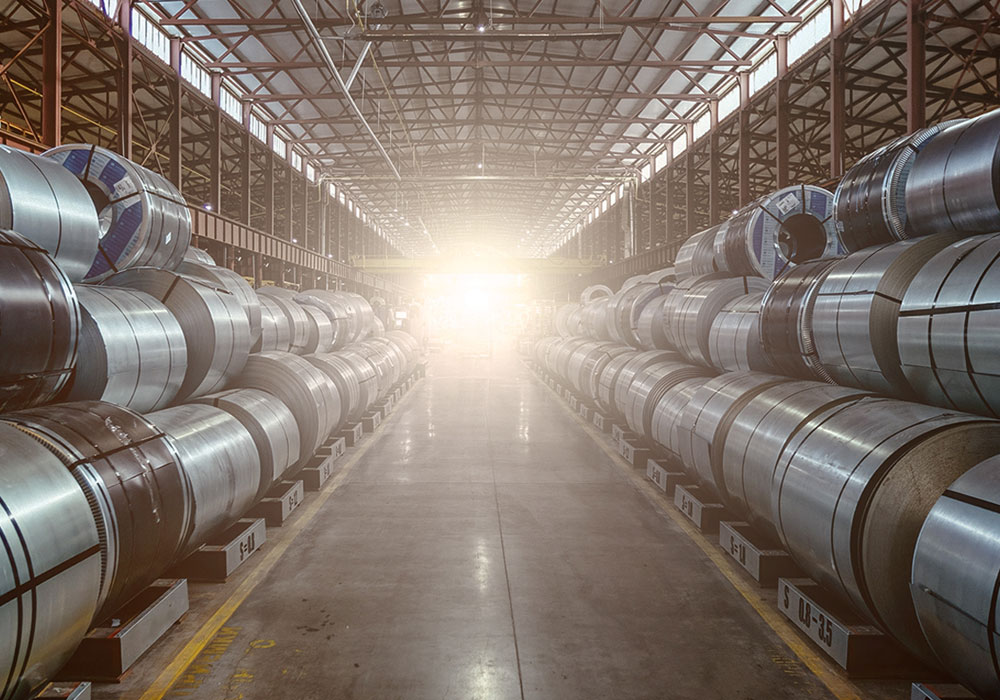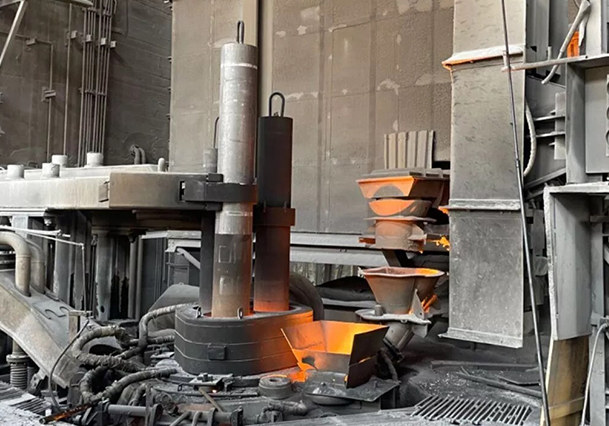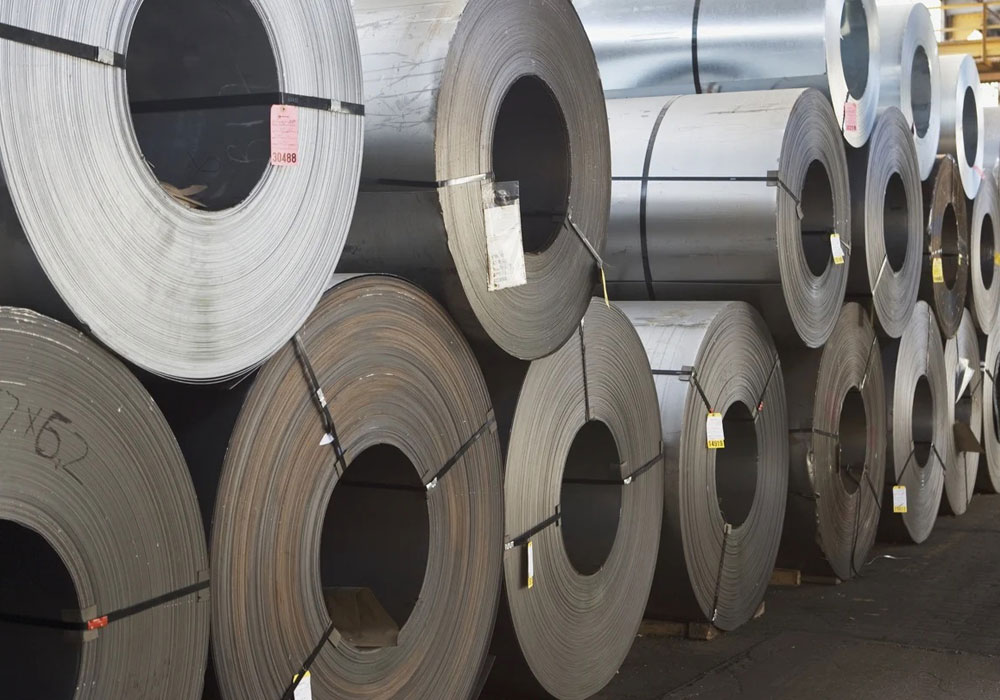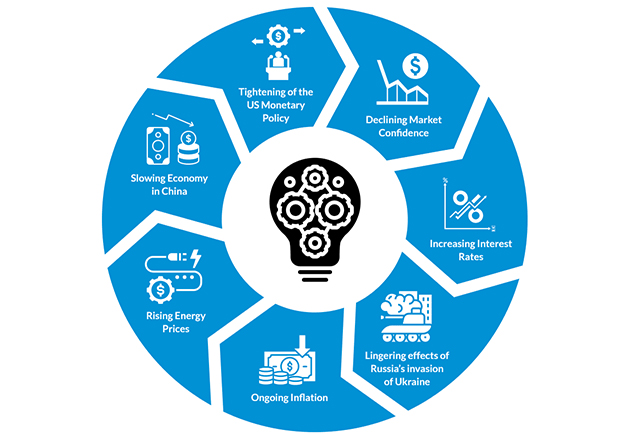

1. Advanced Coating
Advanced coating plays an important role in the steelmaking industry by enhancing surface performance, durability, and quality of steel products. Galvanizing and polymer coatings provide resistance to corrosion and abrasion by applying thin layers of polymers like epoxy and polyester. Also, coatings like ceramic as well as thermal sprays and passivation contribute to the overall longevity and aesthetic appeal of steel products. This enables a variety of applications in the construction, aerospace, automotive, and manufacturing industries.
Allium Engineering offers Coated Rebar Technology
US-based startup Allium Engineering provides coated rebar technology for the steel industry. It increases the steel products’ lifetime and reduces carbon emissions. For this, the startup uses a thin stainless steel layer and a protective oxide barrier coating to shield the steel core against corrosion. The coating prevents rust and water buildup on the surface of the steel rebar to ensure better performance. Allium Engineering allows the construction industry to coat steel and concrete structures exposed to the environment to reduce emissions and maintenance costs.
Nanosentrix makes Micro and Nanomaterial Inks
Indian startup Nanosentrix manufactures micro- and nano-material inks and screen printing solutions for the steel industry. It offers Nanosentrix Thermoresist, a graphite electrode surface coating to prevent the oxidation of electrodes in a blast furnace. The startup’s coating utilizes an aqueous solution of self-healing nanocomposite suspension to improve oxidation resistance during baking. Nanosentrix also increases the diameter of an electrode tip to reduce the linear wear of the overall electrode in an electric arc furnace (EAF). Nanosentrix caters to the steel smelting industry and EAF manufacturers, allowing them to improve the lifecycle of an electrode by preventing oxidation.
2. Smart Steel Manufacturing
Smart manufacturing processes incorporate industry 4.0 solutions and the Industrial Internet of Things (IIoT) to transform steelmaking. Advanced steel technologies and data-driven solutions optimize production processes, increase efficiency, and enhance product quality. For example, data analytics, machine learning, advanced sensors, and monitoring systems enable early detection of issues and provide precise control of machinery. The technologies also help in the supply chain optimization of raw steel by integrating data from suppliers, inventory systems, and production schedules.
Foresight Data Machines develops Process Control Solutions
Foresight Data Machines is a UK-based startup that builds process control solutions for EAF steelmaking. Its AI-enabled solution understands the relationship between raw material quality and operating procedures to provide meaningful insights. The solution translates the data into actionable process control recommendations to improve energy and raw material efficiency, yield, and quality. Foresight Data Machines thus helps operators, process engineers, plant managers, and purchasing teams in raw material inventory and quality management.
XYMA Analytics creates Measurement Sensors
Indian startup XYMA Analytics provides multi-point sensing, temperature, and level management sensors for steel manufacturing businesses. It offers μTMaps and μSTMaps – two multi-point high-temperature mapping sensors that use a single waveguide sensor technology. The sensors feature insulation damage and humidity control to detect abnormal temperature drops and possible humidity and insulation damage in the pipelines. XYMA Analytics empowers steel manufacturers by safeguarding their processes and enhancing productivity.
3. Recycled Steel
One of the recent trends in the steel industry is the use of recycled scrap materials as the primary raw material. The recycling of metals takes place in an electric arc furnace, which provides an energy-efficient alternative to traditional steelmaking. The process involves collecting and sorting scrap metal, including end-of-life steel products, to melt and refine the alloys and adjust composition in an EAF. Recycled steelmaking offers many environmental benefits such as lowering carbon emissions and reducing the wastage of valuable natural resources. This allows manufacturers to reduce costs of production and achieve net zero emissions.
PRINZ Blades advances Low-Carbon Steelmaking
German startup PRINZ Blades manufactures green steel from EAF and renewable energy. The startup uses recycled steel scraps and alloys, along with a photovoltaic system with multiple solar modules, to manufacture a range of blades. The blades tamper with a hardening process for an optimal balance of tenacity and hardness to offer increased durability and performance. With resource-efficient and environmentally friendly processes and raw materials, the startup allows steel manufacturers to increase process sustainability. PRINZ Blades offers product lifetime optimization, welding, and maintenance solutions to direct customers and industries.
Envigen offers Closed-Loop Metal Recovery
Envigen is a UK-based startup that offers closed-loop metal recovery and recycling to provide shredded stainless steel and alloys. The solution uses an energy and time-efficient process to reclaim copper, aluminum, steel, and plastic from waste. The startup leverages renewable energy to power furnaces in the recycling plant and also feeds electricity back into the grid, enabling a circular economy. Envigen produces sustainable and recycled stainless steel for the shipbuilding, civil engineering, power plant, and medical industries while reducing the cost of raw materials.
4. 3D Printing
3D printing is one of the most reliable processes to manufacture complex metal parts, components, and prototypes. Traditional steelmaking works on subtractive principles like cutting, shaping, milling, and grinding, which increases the scraps from production. Additive manufacturing enables the direct fabrication of steel parts layer by layer to eliminate wastage. It uses powder bed fusion and direct energy deposition technology to melt the metal powder. For melting, a 3D printer utilizes a laser, electron beam, or plasma arc to make parts for precise applications. Such advanced steel technology allows steel product manufacturers to make parts with precision and eliminate raw material wastage.
Aditiv Solutions deploys Metal Additive Manufacturing Solutions
Aditiv Solutions is a startup from South Africa that designs and builds metal additive manufacturing equipment. Its HYRAX is a 3D printing system that allows the development of intricate parts directly from metal powder. The solution uses powder bed fusion technology equipped with precision lasers and optical systems to ensure quality. Aditiv Solutions deploys machine design, simulation, code development, and product life-cycle management to offer cost-effective manufacturing solutions to steel manufacturers.
Headmade Materials provides Additive Material for Powder Metallurgy
German startup Headmade Materials offers materials for the 3D printing and powder metallurgy industries. Its sinter-based ColdMetalFusion technology provides high-strength eco-friendly parts to simplify cleaning and handling. The startup’s feedstock fits into existing machines and processes to eliminate new equipment costs and help in producing quality metal parts. Headmade Materials embeds metal powders in a plastic matrix that allows better metal particle binding to improve occupational safety in additive manufacturing and automotive industries.
5. Robotic Automation
Robotic automation plays a vital role in modern manufacturing processes. It revolutionizes the steel industry by improving efficiency, productivity, safety, and quality control. By incorporating technologies like AI and continuous monitoring, steel manufacturers automate their plants with greater efficiency. Robots in steelmaking enable autonomous raw material handling, assisted welding and assembly, continuous casting, and automated furnace operations. Robotic automation also allows manufacturing plant owners and managers to streamline repetitive and dangerous tasks by removing the need for direct human involvement.
Wattman delivers AI-Powered Robotic Manufacturing
Chinese startup Wattman provides industrial intelligence with robots, machine vision, and 3D intelligence perception to steel manufacturers. It offers WATT iRobot, a smart robot series for anode carbon block cleaning and target object repairing. The startup’s robots feature camera-based arms for performing 3D reconstruction and analysis of objects. It also offers intelligent mucking and palletizing robots to enable the automatic handling of stacking operations for steel. This way, Wattman develops a smart lifecycle management system for metallurgical furnaces, improving the operational efficiency of steel plants.
Mech-Mind Robotics enables Intelligent Robot Control
German startup Mech-Mind Robotics offers solutions for intelligent robot control using 3D simulations. The startup offers Mech-Viz, a robot programming software for path planning, collision detection, and grasp planning. The all-in-one system enables the programming of robots visually and code-free by using AI to calculate the fastest motion sequence. By integrating a robot controller with Mech-Viz, Mech-Mind helps automotive, logistics, home appliance, and steelmaking industries utilize autonomous robots for process automation.



